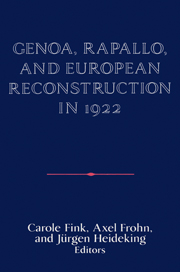Book contents
- Frontmatter
- Introduction
- 1 Beyond Revisionism: The Genoa Conference of 1922
- 2 The Genoa Conference of 1922: Lloyd George and the Politics of Recognition
- 3 A Rainy Day, April 16, 1922: The Rapallo Treaty and the Cloudy Perspective for German Foreign Policy
- 4 Reparations in 1922
- 5 Germany and the United States: The Concept of World Economic Interdependence
- 6 American Policy Toward Debts and Reconstruction at Genoa, 1922
- 7 French Plans for the Reconstruction of Russia: A History and Evaluation
- 8 The Oil Problem and Soviet-American Relations at the Genoa Conference of 1922
- 9 Italy at the Genoa Conference: Italian-Soviet Commercial Relations
- 10 The European Policy of Czechoslovakia on the Eve of the Genoa Conference of 1922
- 11 The Genoa Conference and the Little Entente
- 12 The Role of Switzerland and the Neutral States at the Genoa Conference
- 13 The Genoa Conference and Japan: A Lesson in Great-Power Diplomacy
- Maps
- Appendix
- Bibliography
- Contributors
- Index
2 - The Genoa Conference of 1922: Lloyd George and the Politics of Recognition
Published online by Cambridge University Press: 05 January 2013
- Frontmatter
- Introduction
- 1 Beyond Revisionism: The Genoa Conference of 1922
- 2 The Genoa Conference of 1922: Lloyd George and the Politics of Recognition
- 3 A Rainy Day, April 16, 1922: The Rapallo Treaty and the Cloudy Perspective for German Foreign Policy
- 4 Reparations in 1922
- 5 Germany and the United States: The Concept of World Economic Interdependence
- 6 American Policy Toward Debts and Reconstruction at Genoa, 1922
- 7 French Plans for the Reconstruction of Russia: A History and Evaluation
- 8 The Oil Problem and Soviet-American Relations at the Genoa Conference of 1922
- 9 Italy at the Genoa Conference: Italian-Soviet Commercial Relations
- 10 The European Policy of Czechoslovakia on the Eve of the Genoa Conference of 1922
- 11 The Genoa Conference and the Little Entente
- 12 The Role of Switzerland and the Neutral States at the Genoa Conference
- 13 The Genoa Conference and Japan: A Lesson in Great-Power Diplomacy
- Maps
- Appendix
- Bibliography
- Contributors
- Index
Summary
It would be difficult to exaggerate the interest shown by historians and publicists in the period 1918-22. Lloyd George has been one of the most written about politicians in British contemporary history, barring Churchill. Until the 1960s or even 1970s most of this attention was negative, the degree of excoriation for his alleged “adventurism” in foreign affairs vying with that for his “duplicity” in domestic matters. A. J. P. Taylor's establishment of the Beaverbrook Library (now in the House of Lords) did much to remedy this tendency, as did the tireless writings of Kenneth Morgan.
Until fairly recently, comment on the foreign policy pursued by the Lloyd George coalition usually was seen as subsidiary to that on domestic matters. We, of course, have Ullman's three-volume study of Anglo-Soviet relations until 1921, and Stephen White has contributed his Britain and the Bolshevik Revolution (1979) and, now, The Origins of Detente (1985) on Genoa itself. Carole Fink's The Genoa Conference (1984) is the inspiration for this whole volume of essays and speaks for its own importance. Other works not of direct relevance are Michael Fry's Lloyd George and Foreign Policy (1977), which only goes up to 1916, and Michael Dockeril's contribution to Taylor's essay collection on Lloyd George's foreign policy, again only up to 1914.
- Type
- Chapter
- Information
- Genoa, Rapallo, and European Reconstruction in 1922 , pp. 29 - 48Publisher: Cambridge University PressPrint publication year: 1991

